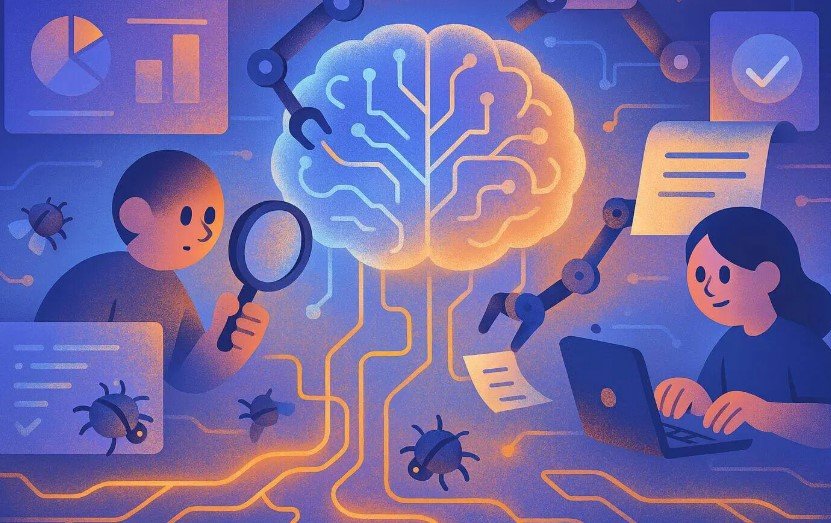Google’s latest report shows artificial intelligence is changing software development in big ways. The 2025 DORA study, based on surveys from nearly 5,000 tech experts worldwide, reveals AI helps top teams work faster while making problems worse for struggling groups.
AI Use Skyrockets Among Developers
Developers around the world now turn to AI tools every day. The report finds 90 percent of software pros use AI in their work, up 14 percent from last year. This jump shows how fast AI has become a core part of coding and building apps.
Teams spend about two hours daily with AI, mainly for writing code and fixing bugs. Over 80 percent say it boosts their output, letting them finish tasks quicker. Yet, many still check AI work by hand because trust remains low.
This growth ties into broader trends, like new AI models from companies such as OpenAI and Meta pushing tools that write code. Experts predict even more adoption by late 2025 as these tools get smarter.
How AI Acts as an Amplifier for Teams
AI does not fix broken teams on its own. Instead, it ramps up what already exists, the report explains. Strong teams with clear processes see big wins, while weak ones face more chaos.
For example, high performers use AI to speed up reviews and spot errors early. This leads to better code quality for 59 percent of users. On the flip side, teams with poor setups find AI highlights flaws like messy workflows.

Recent events, such as major firms like Meta planning to replace some engineers with AI by 2025, underline this point. Leaders warn that without solid basics, AI could slow progress rather than help.
Interviews in the study back this up. One developer shared how AI cut their debug time in half, but only after their team improved internal tools.
Seven Key Practices That Drive AI Success
The report outlines seven practices that set winning teams apart. These focus on building strong foundations before diving into AI.
Teams that follow these see the most gains. Here is a breakdown in a simple table:
| Practice | Description | Benefit |
|---|---|---|
| Clear Workflows | Define steps for tasks and reviews | Reduces errors and speeds up work |
| Quality Platforms | Use reliable internal tools | Makes AI integration smooth |
| Team Alignment | Ensure everyone shares goals | Boosts collaboration with AI |
| Continuous Learning | Train staff on AI best uses | Improves trust and skill |
| Feedback Loops | Regularly check AI outputs | Catches issues early |
| Security Focus | Build in safeguards from the start | Protects against AI risks |
| Measure Outcomes | Track AI impact on projects | Guides better decisions |
Adopting these practices helps teams avoid pitfalls. For instance, a focus on security prevents data leaks, a growing concern with AI tools.
Many organizations now invest in these areas. A recent survey from another tech giant showed similar results, with top firms reporting 20 percent faster delivery after strengthening platforms.
Weak teams often skip these, leading to amplified problems like buggy code or delays.
Trust Gaps and Challenges in AI Adoption
Not everyone fully trusts AI yet. The study notes only about 25 percent of developers rely on AI outputs without double-checking. This caution stems from past issues, like AI generating wrong code.
Common challenges include uneven tool quality and integration hurdles. Some teams struggle to blend AI with existing systems, causing frustration.
- Productivity dips when AI suggests bad fixes.
- Training needs rise as tools evolve quickly.
- Cost concerns grow for small teams adopting premium AI.
Despite these, 80 percent report gains in efficiency. Balancing speed with verification remains key.
Recent news from AI labs, like updates to models such as Grok and Claude, aims to build more trust through better accuracy.
Two Factors That Shape AI Outcomes
Platform quality and team culture play huge roles in AI success. The report stresses high-quality internal platforms as a top factor. These provide the base for AI to shine.
Culture matters too. Teams with open mindsets adapt faster and innovate more.
For example, companies like Google itself use strong platforms to test AI features safely. This leads to fewer failures and quicker rollouts.
On the flip side, poor culture can magnify distrust, slowing adoption.
What This Means for Software Development’s Future
The findings point to a future where AI is everywhere in dev work, but success depends on preparation. As AI tools advance, teams must focus on basics to thrive.
This aligns with 2025 trends, including new regulations on AI use in critical sectors. Experts forecast that by 2026, AI could handle 90 percent of basic coding tasks.
Leaders should assess their teams now and invest in the seven practices. This could turn AI from a risk into a real edge.
What do you think about AI in your work? Share your thoughts in the comments and pass this article along to fellow developers.








